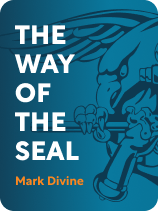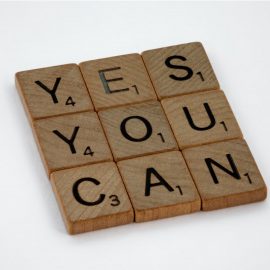

This article is an excerpt from the Shortform book guide to "The Way of the SEAL" by Mark Divine. Shortform has the world's best summaries and analyses of books you should be reading.
Like this article? Sign up for a free trial here.
How do you follow your inner compass? Why is it important to identify your inner compass to be an effective leader?
According to Mark Divine’s book The Way of the SEAL, your inner compass is the internal force based on your values and goals that guide you. Sticking to these values are imperative for being a great leader in business.
Continue reading to learn how to follow your inner compass in just four steps.
Identify Your Core Compass
Knowing how to follow your inner compass will prevent you from getting thrown by obstacles that arise and keep you focused so you can operate from your greatest point of strength.
(Shortform note: To reinforce your inner compass, medical experts say that friendships can also support you through difficult times. Friendships strengthen you by boosting your happiness, self-confidence, and self-worth; reducing your stress and feelings of isolation; and encouraging you to engage in healthy behaviors that support your well-being and goals.)
For example, imagine that you’ve been offered a promotion at work but your inner compass hinges on a stable family and home life. The promotion will earn you extra money, but also require that you spend more time at work—including on weekends when you usually watch your kids’ sports games. You decide to turn down the promotion because spending time with your family is more important to you than the extra money from the promotion.)
To identify your inner compass, you have to know what you care most about in life (your values), what fundamentally motivates you, what you feel passionate about, and what an ideal version of yourself looks like.
1. Identify Your Values
Central to your compass is your values—the things most important to you in life and that you won’t compromise on. Your values guide your actions and keep you on track.
Divine says that following his values helped him make a difficult, life-altering choice. Shortly after he got married, the Navy deployed him to multiple locations for extended periods—leaving his wife home alone. When she said she couldn’t continue their marriage without him home more consistently, Divine thought about what he really wanted in life. He loved his SEAL adventures and team, but his inner compass centered on a pledge to live in the present, allow the past to be the past, and create the future he wanted—in this case, a family. Divine left active service for the reserve SEALs and his marriage. He says living his values was the right choice.
To identify your values, reflect on how you’d react in different challenging situations. First, get a pen and paper and find a quiet place to sit. Sit up straight, close your eyes, and spend five minutes breathing deeply from your abdomen to relax your body and connect with your subconscious. When you’re done, open your eyes and jot down what you would do if you:
- Saw someone drowning in the ocean
- Witnessed someone shoplifting baby formula
- Saw someone being bullied by a group of people
- Were asked to donate a kidney to save someone you don’t know
Reflect on your answers. What do they suggest about the type of person you are? How does this match up with values you want to embody? For instance, are your answers self-protective or focused on helping others? If your answers aren’t aligned with who you want to be, it’s an opportunity to explore ways you can develop the values you want to live.
Once you have a sense of some values you’d like to embody, Divine recommends that you live by those values so they become an integral part of you.
To do this, get paper and a pen. List qualities you’d like to embody (for example, the ones you identified in the exercise above) and avoid. For example, maybe you’d like to be more authentic and connected, and less critical and negative. Once you have your list, write down small actions that will make you become more of the things you want to be and less of the things you don’t.
For example: “When I share with my partner how I truly feel about them and thank them for loving me, I become more authentic.”
Once you’ve completed this practice, write six to 10 statements reflecting on the qualities that resonate most with you to solidify your values and who you want to be.
2. Know Your Motivation
Divine says that as you gain clarity on your values, you need to know the underlying reasons for your actions. Understanding your motivations keeps you focused amid uncertainty, which enables you to perform at your peak. (Shortform note: Psychologists say there are two types of motivation: Intrinsic—you do things because you find them rewarding for their own sake—and extrinsic—you do things to either earn a reward or avoid punishment.)
To identify your motivations, write several sentences describing why you’re on earth and what you’re here to do. Each day, revisit what you’ve written to remind yourself of your motivation.
(Shortform note: You may find it hard to generate ideas of things that motivate you. To give you a running start, experts suggest that you rank your driving forces on a scale of 1-10 (forces with the higher numbers drive you most strongly). Some driving forces include: power, wealth, status, having a sense of meaning, excelling and achieving, independence, and stability and safety.)
3. Identify Your Passion
Next, Divine says you should identify your passions. When you know what’s most meaningful and rewarding to you in life, you’ll be motivated to do these things more. This will lead to positive changes that help you function at your best.
Divine says that as a young man, he was passionate about his personal and physical development, martial arts, adventure, and leadership. He saw a Navy SEAL “Be Someone Special” poster that resonated with his desire to live a life of adventure, be mentally and physically challenged, and lead. Divine explored other career options but ultimately stuck to his guns, followed his passion, and lived his dream of being a SEAL.
To identify your passions, write down:
- The names of books, movies, and people that inspire you, and why
- Activities you’d do if obstacles didn’t exist, why they’re meaningful, and how they could make the world better
- Qualities you embody that you feel great about
Your answers should provide some insight about the activities and causes you feel passionate about. However, Divine says that if you discover that the passions you list don’t resonate with you, or won’t be helpful to the world in some way, this is a chance to assess whether they’re really what make you tick.
4. Imagine Your Future Self
Now that you know your values, motivations, and passions, Divine says you should envision the person you want to be in the future—the best version of yourself. This will bolster your self-exploratory work and give you an ideal to aim for, which will help you operate at your peak.
To envision your ideal self, find a quiet place to sit, close your eyes, and breathe deeply for five minutes to relax. Then, take several minutes to picture an ideal version of yourself three months from now, living your values, motivations, and passions fully. Include as many senses as possible to strengthen the experience: sounds, sights, colors, smells, how you feel.
After several minutes, repeat this practice—but picture your ideal self a year from now. Then, picture yourself three years from now. When you’re done, unite all three versions of your ideal self into the “now,” and feel yourself as that person in this moment.

———End of Preview———
Like what you just read? Read the rest of the world's best book summary and analysis of Mark Divine's "The Way of the SEAL" at Shortform.
Here's what you'll find in our full The Way of the SEAL summary:
- A former Navy SEAL's strategies to help business leaders
- A mind-body technique that combines yoga, martial arts, and SEAL training
- How to bolster and harness your mental fortitude






